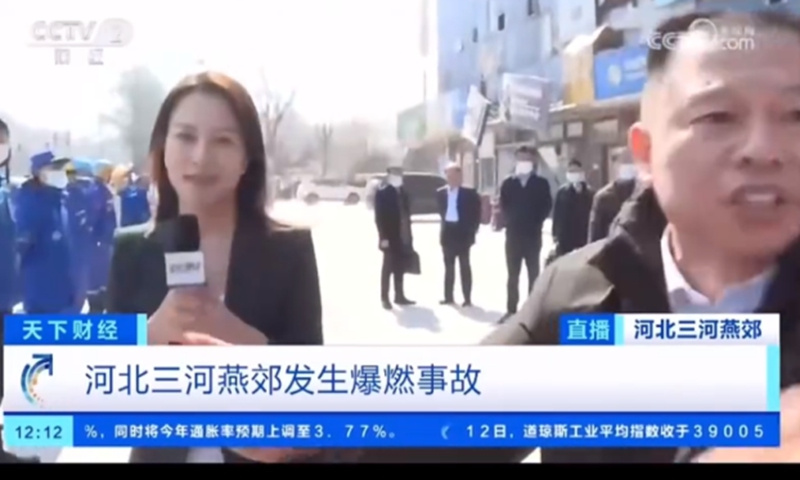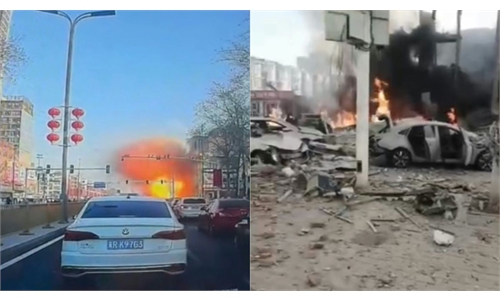Local authority in Sanhe apologizes for obstructing journalists covering explosion that resulted in 7 deaths

A journalist was obstructed by local law enforcement officials when covering an explosion in Sanhe city. Photo: Screenshot of live broadcast
The local authority in Sanhe city, where a deadly explosion occurred on Wednesday resulting in seven deaths and 27 injuries, apologized early Thursday for "forcibly dissuading" reporters from China Central Television and other media outlets from covering the incident. This has sparked wide discussion on protecting journalists' rights and duties when covering sudden incidents of public concern, especially in cases of disasters.
The explosion took place in a building in the town of Yanjiao, located to the east of Beijing, on Wednesday morning. The incident was reportedly caused by a suspected gas leak at a local business shop.
As of now, all the injured have been sent to hospitals for treatment, and the cause of the accident is currently under investigation.
Some videos circulating online on Wednesday showed a reporter from CCTV who was conducting a live broadcast at the core site of the explosion being approached by two men in black. They blocked the camera and interrupted the reporter's live broadcast interview. At that moment, the reporter was describing the local traffic conditions, saying that "a safety cordon was set up 500 meters away."
Another video circulating online shows a woman wearing a jacket with the CMG logo (referring to China Media Group) saying, "the three of us from CCTV were jostled by more than a dozen people."
The obstruction of journalists' reporting has sparked public discussion. The All-China Journalists Association raised three questions in a WeChat post on Wednesday night: "Should journalists conduct interviews? Are reporters causing trouble? Can a press release truly replace on-site reporting?"
Journalists should conduct interviews, the association emphasized. In the face of such a significant public safety incident, the public eagerly awaits more information. Reporters, using their professional lenses to document the actual conditions of the disaster and the rescue efforts, can respond to public concerns to the greatest extent and prevent the spread of rumors, it noted.
The association said reporters are not causing trouble. Reporters truthfully reporting on-site situations, conducting their reporting calmly, professionally, and objectively, and adhering to journalistic ethics can alleviate public anxiety to the greatest extent and ensure the people's right to know. Even after the camera was blocked and adjustments were made, the on-site reporter also said, "Forces from emergency services, firefighting, and public security are getting involved..." the association noted.
The association also stressed that a press release cannot replace on-site reporting. Official press releases cannot cover all details, and information on the internet is often subject to rumors, making supplemental information from the media particularly important.
It also suggested that local authorities should not hinder reporters from carrying out their duties in a simplistic and crude manner in an attempt to control public opinion.
The local authority in Sanhe expressed deep regret on Thursday for preventing reporters from CCTV and other media outlets from covering the explosion incident in Yanjiao and offered apologies.
They stated that lessons will be learned, relevant work mechanisms to be further improved, and a proactive approach will be taken to establish a communication platform with the media. This is aimed at genuinely safeguarding journalists' rights to report, providing more conveniences, and responding promptly to societal concerns.
The local authority explained that as the rescue efforts progressed, the expert group at the command center, after professional testing, discovered a risk of natural gas leakage at the accident site and recommended that all non-rescue personnel evacuate beyond the safety cordon.
Adhering to the principle of prioritizing life, the command center required all non-professional rescue personnel and nearby residents to evacuate quickly to prevent secondary disasters.
On-site order maintenance personnel, following the command center's instructions, advised non-professional rescue personnel, including media reporters, to leave. However, during this process, reporters who insisted on conducting interviews on-site were forcibly dissuaded.
Due to the front-line workers' poor communication skills and their crude and simple methods, misunderstandings and public scrutiny arose among the reporters, leading to adverse social impacts, the local authority said.
Former editor-in-chief of the Global Times Hu Xijin stated in a Weibo post on Wednesday that there is a strong opposition to local police obstructing reporting and expelling reporters.
He emphasized that covering on-site reports of sudden incidents that are not classified and of public concern, especially in cases of disasters, is both a right and a duty of news organizations. He urged local governments to facilitate news reporting without disrupting on-site rescue efforts, rather than interfering or stopping it. "Such obstruction of reporting is clearly a result of old ways of thinking and represents a misuse of authority that needs to be corrected," he noted.
In some places, when fires, collapses, and other accidents occur, there is a preference for simple text reports, preventing journalists from going to the scene for live coverage. Moreover, videos related to the incident that are not graphic are deleted online, Hu said, noting that this shows disrespect for the public's right to know and imposes baseless restrictions on the reporting and supervisory rights of the news media.
Global Times

